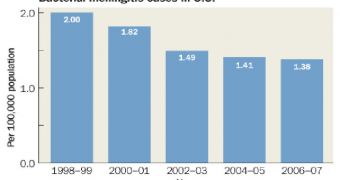The efficiency of vaccines aimed at destroying bacteria that cause meningitis has caused the incidence rates of this condition to drop sharply over the past decade, much to the relief of doctors and parents.
Pediatricians, for example, were worried sick that a kid running a high fever was suffering from meningitis just a few decades ago. In the mean time, advancements made in science have increased the efficiency of vaccines considerably.
A national survey conducted in the United States has just revealed that the incidence of bacterial meningitis has been decreasing constantly since 1998. The investigation covered a total of 17 million people from all over the country.
Between 1998 and 2007, the research shows, number of meningitis cases dropped by more than 31 percent. Details of the work are being published in the May 25 issue of the prestigious New England Journal of Medicine.
Historically, the two main triggers of brain inflammation were the Haemophilus influenzae type B and the Streptococcus pneumoniae. The Hib vaccine is aimed at destroying the former, while the PCV vaccine easily kills the latter.
“For people taking care of kids since the 1980s, the world of meningitis has completely changed in the United States – and it’s because of [these] two vaccines,” explains research scientist Matthew Davis.
The expert, who was not a part of the new investigation, holds an appointment as a pediatrician at the University of Michigan Medical School, Science News reports.
According to the new statistics, meningitis incidence took a drastic hit in the decade between 1980 and 1990, when the Hib vaccine was first introduced. Children began undergoing routine immunization procedures, and this led to fewer instances of potentially-lethal brain inflammation.
In the 2000s, the PCV vaccine called Prevnar-7 was approved by the US Food and Drug Administration (FDA), and this delivered the second blow to the disease. S. pneumoniae could no longer cause meningitis, ear infections, pneumonia, and a host of other illnesses.
Between 1998 and 2007, PCV dropped S. pneumoniae-induced meningitis rates by more than 26 percent, which is a remarkable decrease. A new version of the vaccine, developed more recently, is even more effective.

 14 DAY TRIAL //
14 DAY TRIAL //